Services for Philanthropies
Services for Philanthropies
Nonviolent movements for human rights, freedom, and justice are rising around the globe.
Supporting these movements—and the field of civil resistance itself—are great opportunities for a variety of grantmakers to increase their impact. However, engaging in this work can be complex and impact funding strategy, operations, staffing, and implementation.
I offer these services to support funders:
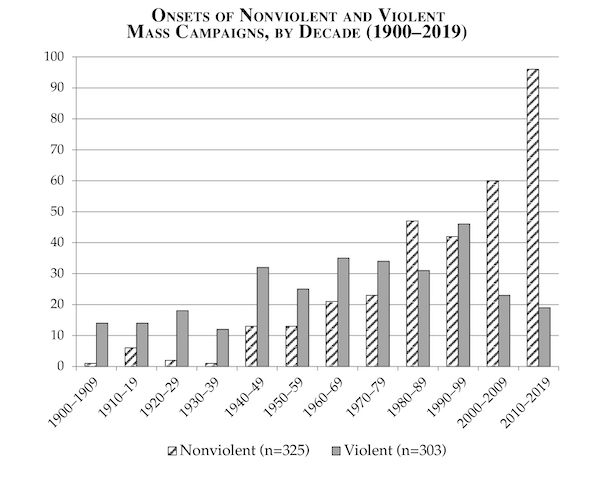
The number of new nonviolent movements worldwide seeking political transitions rose by 60 percent over the last two decades—from 60 new movements in 2000-2009 to 96 from 2010-2019.
Source: Erica Chenoweth. “The Future of Nonviolent Resistance.” Journal of Democracy, vol. 31, no. 3, July 2020, pp. 69-84.
More information about these services is below. Contact me for a free consultation.
Nonviolent movements for human rights, freedom, and justice are rising around the globe.

The number of new nonviolent movements worldwide seeking political transitions rose by 60 percent over the last two decades—from 60 new movements in 2000-2009 to 96 from 2010-2019.
Source: Erica Chenoweth. “The Future of Nonviolent Resistance.” Journal of Democracy, vol. 31, no. 3, July 2020, pp. 69-84.
Supporting these movements—and the field of civil resistance itself—are great opportunities for a variety of grantmakers to increase their impact. However, engaging in this work can be complex and impact funding strategy, operations, staffing, and implementation.
I offer these services to support funders:
More information about these services is below. Contact me for a free consultation. If you have a need that doesn’t fit into the above categories, you can also let me know and I may be able to help you, or refer you to someone who can.
Consulting on Grantmaking Strategy and Implementation
Numerous studies find that civil resistance movements are one of the most powerful drivers of democratic change in the world.
However, effective movement-centered funding often entails different strategies, processes, and theories of change than grantmaking to support traditional advocacy efforts. Not all movements are set-up to receive significant sums of money, and there are well-founded concerns that funding could distort local agendas or do more harm than good.
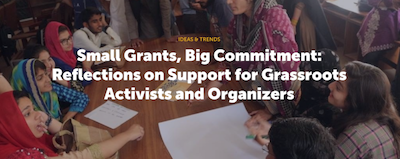
A post from my four-part blog series on movement-centered funding.
I help philanthropies navigate these circumstances by evaluating existing grantmaking programs, supporting development of new strategies and processes, addressing questions of implementation, and building understanding and buy-in about the benefits of movement-centered funding.
I ran grantmaking programs at the International Center on Nonviolent Conflict that were designed to reach grassroots activists, support their work in movements, and advance a research agenda to get them the information they need. I have also written about funding for civil resistance and movements.
Presentations to and Consultations with Leadership and Boards of Directors
It is important to build understanding of movement-centered funding at multiple levels within a philanthropy—including among staff, leadership, and the Board of Directors.
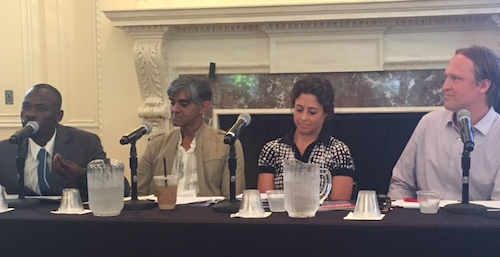
Moderating and speaking at the "Movement-centered Funding to Promote Human Rights and Justice" panel that I organized with ICNC at the Human Rights Funders Network conference, July 12, 2017.
As a first step to help in this process, I listen closely to people's questions, concerns, and hopes for their grantmaking. I then bring a mix of data and research, movement case studies, and examples of successful programs to the conversation in response.
There is no one-size-fits-all approach to supporting civil resistance movements—different philanthropies have different specializations, goals, grant sizes, risk tolerance, staff capacities, and potential constraints. Fortunately, there are many ways to support movements, and these can be adapted to a funder's specific circumstances. I seek to start meaningful conversations and provide practical guidance as needed, so that philanthropies can find the fit that is best for them.
Staff Training
Information is power, helping to guide the decisions of grantmaking staff and increasing their impact.
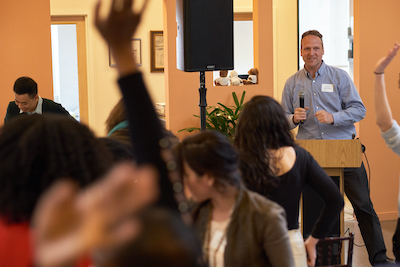
Speaking on “A Movement-centered Funding Model” at the Nathan Cummings Foundation at the Why Resistance is Here to Stay: The Future of Popular Movements in America event, April 24, 2018
I provide staff trainings and workshops that combine leading research findings with practitioner insights. New knowledge, cases, and practices of civil resistance are constantly developing. Workshop duration can vary from a few hours to several days in length, depending on the philanthropy's goals. See below ("Grantee Training") for a sampling of topics I can cover.
I also offer longer term regular coaching (i.e. 1-4 sessions per month) and check-ins with staff to provide ongoing guidance.
Grantee Training
Activists and organizers have one of the most important, and challenging, jobs in the world.
Philanthropies can catalyze their impact by creating training, educational and skill-building opportunities for them.
Over nearly two decades I have organized and led civil resistance workshops—from 4 hours to 8 days in length—for activists and organizers. I have engaged with people from democratic contexts as well as many living under fully authoritarian governments, with a range of causes including fighting for democracy and self-determination; combating corruption; securing human rights; and others.
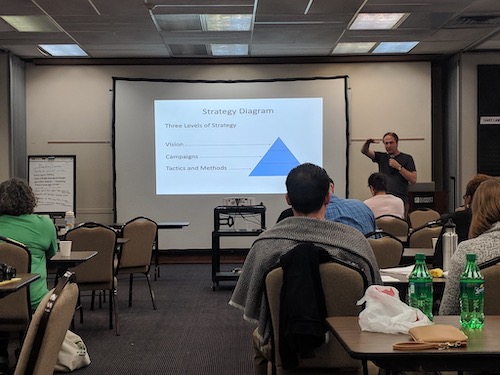
Presenting at the 2017 James Lawson Institute, Nashville, TN
Workshop planning always begins with listening. Each is customized based on audience, movement goals, and local political, social, and economic circumstances. The choice of topics covered and the balance of presentation, facilitation, and breakout group work is flexible based on these factors.
A sample of workshop topics that can be covered include:
- Movement formation and development
- Strategic planning for civil resistance movements
- Principles of effective nonviolent resistance
- Tactical selection, innovation, and sequencing
- Case studies of specific movements
- Communications and message design
- Building and maintaining unity in a movement
- Movement leadership and organizational structure
- Designing recruitment, training and knowledge management efforts
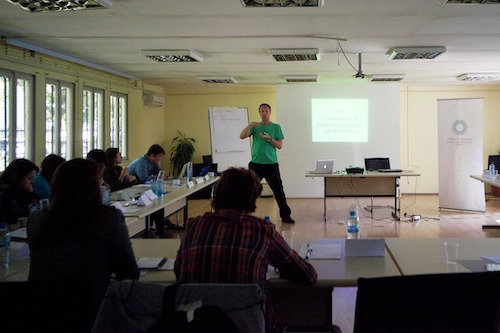
Leading a workshop in Skopje, North Macedonia in 2014. Photo credit: Roska Vrgova
- Coalition building
- Strategies for dealing with repression
- Making repression backfire
- Fostering defections
- Engaging with external allies
- Consolidating victory
Depending on workshop length and local needs, I can work alone, co-lead with a local partner, or draw from my network to bring in a co-presenter/facilitator to best advance the workshop's goals.
I have significant experience working with simultaneous and sequential translation, as needed.
Contact Me
For more information about my services and costs, contact me. I can offer a free initial consult.
